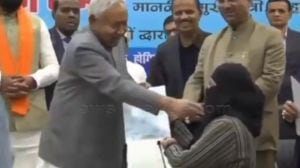In a setback for the Adani Group, the DMK-led Tamil Nadu government has cancelled its global tender for procurement of smart meters despite the Adani Energy Solutions Ltd (AESL) emerging as the “lowest bidder” for it.

This package alone involved the proposed installation of over 8.2 million smart meters under the Centre-funded Rs 19,000 crore Revamped Distribution Sector Scheme (RDSS), which is envisaged for installing smart meters for all electricity connections in the state barring the agricultural ones.
The Tangedco officials said the prices quoted by the AESL to bag the tender were “unacceptable despite negotiations to bring down the costs”.
All four tenders, floated in August 2023, have been cancelled, including those for the remaining three packages covering other districts, due to “administrative reasons”, sources in the Tangedco said, adding that the government would refloat the tenders soon.
The M K Stalin government’s move comes a month after US prosecutors indicted Adani Group chairman Gautam S Adani, his nephew Sagar Adani and six others for allegedly offering Rs 2,029 crore in bribes to Indian government officials for securing “lucrative solar energy supply contracts” with state electricity distribution companies. The Adani Group has dismissed these allegations as baseless. The US indictment has at its centre the Centre-run Solar Energy Corporation of India (SECI).
Seizing on this development, the Opposition INDIA bloc, especially its leading member Congress, has escalated its attacks on the Adani Group. The DMK is a key constituent of the INDIA alliance.
Story continues below this ad
In the state political circles, the Stalin government’s move to revoke the tenders has been attributed to the allegations surrounding the Adani Group.
Earlier this month, Chief Minister Stalin denied claims that he had met Gautam Adani, challenging the NDA parties, including the BJP and the PMK, to back the demand for a Joint Parliamentary Committee (JPC) probe into the Adani Group’s operations.
“Neither Adani met me nor I met him. Do you need any more explanation on this?” Stalin said in the state Assembly, dismissing accusations of his government’s ties with the Adani Group. The CM also pointed out that the Tamil Nadu electricity board had agreements with public-sector entities like the SECI for solar power procurement, not with Adani.
A pilot project conducted in Chennai’s T Nagar in 2018 saw the deployment of 1.1 lakh smart meters under the Smart City initiative, clearing the decks for its rollout across the state.
Story continues below this ad
The tenders’ cancellation has also raised questions about the smart meter project’s cost-effectiveness. Under the DBFOOT (Design, Build, Finance, Own, Operate, Transfer) model, the Advanced Metering Infrastructure Service Providers (AMISPs) would install and maintain the smart meters, with the Tangedco repaying costs on a per-meter-per-month basis over 10 years.
The AESL, already implementing similar projects in states like Maharashtra and Bihar, was said to have quoted a higher price for Tamil Nadu as compared to other states. “The Adani Group’s bid was significantly higher than the Rs 120 per meter per month it quoted elsewhere,” Tangedco sources said.
Currently, Tamil Nadu is leading the RDSS initiative with a sanctioned plan for over 30 million smart meters. The installation of smart meters is projected to reduce the state’s aggregate technical and commercial losses from 16% to 10%, while enhancing billing efficiency and enabling more effective tariff planning.
An expert who advises the Tangedco on policy said, “The tender cancellation may be all about a cautious approach to avoid allegations of favouritism towards Adani, given the controversies gripping the Group’s business practices, both domestically and internationally.”

































